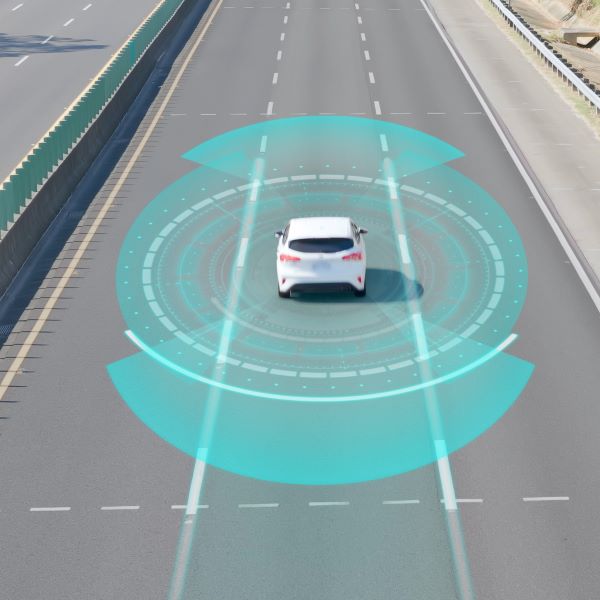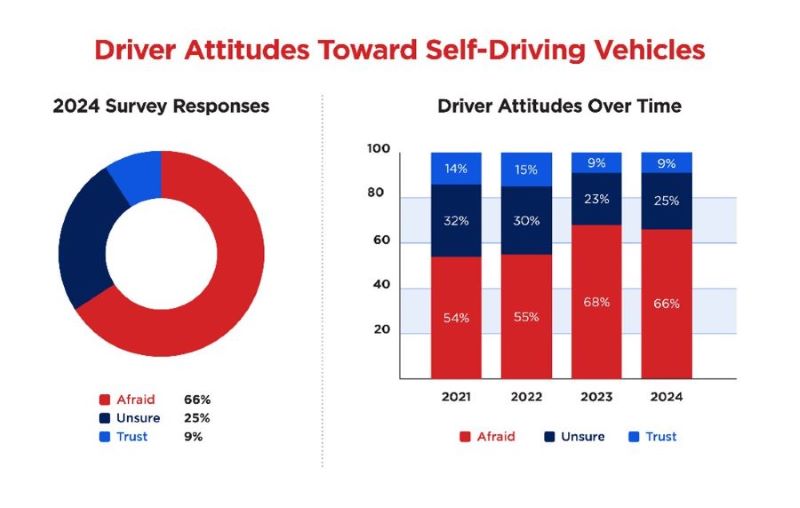AAA: Fear of Self-Driving Cars Persists as Industry Faces an Uncertain Future
AAA: Fear of Self-Driving Cars Persists as Industry Faces an Uncertain Future

According to AAA's latest survey on autonomous vehicles, most U.S. drivers either express fear (66%) or uncertainty (25%) about fully self-driving vehicles - a fear that has not decreased since spiking last year. However, interest in semi-autonomous technologies such as Reverse Automatic Emergency Braking (AEB) and Lane Keeping Assistance remains high. The results infer that to alleviate concerns, the industry should continue to advance vehicle technologies reasonably and with overall consistency in performance.
"There has been an increase in consumer fear over the past few years," said Greg Brannon, the director of automotive engineering research for AAA. "Given the numerous and well-publicized incidents involving current vehicle technologies - it's not surprising that people are apprehensive about their safety.”

Despite people’s fears of self-driving cars, interest in advanced driver assistance systems remains high. AAA's survey found that almost two-thirds of U.S. drivers would want Reverse Automatic Emergency Braking (65%), Automatic Emergency Braking (63%), or Lane Keeping Assistance (62%) on their next vehicle. For interest to remain high, it's crucial to ensure consistency in the performance and naming of these systems.
Interestingly, most U.S. drivers also believe AEB will stop the vehicle when another car, children, adult pedestrians, or bicyclists are in front of or behind the vehicle. However, recent AAA research found that Reverse AEB systems prevented a collision in only 1 of 40 test runs in the context of the backing-up scenarios involving a subject vehicle crossing behind the test vehicle and only 10 out of 20 test runs with the stationary child target behind the test vehicle.
AAA believes that to alleviate consumer concerns, ADAS performance should reflect reasonable and safe scenarios with a clear understanding of the limitations. Advanced vehicle safety technology should enhance driver awareness rather than give the impression of replacing a vigilant driver. When asked if there are cars available that drive themselves while you sleep - fully self-driving vehicles are not yet available for purchase by consumers - four in ten drivers are unsure or think they can buy a car that drives itself while they sleep, a significant safety concern of these technologies.
"AAA wants to collaborate with automakers to establish uniformity in system naming and performance across the industry. By working together, we can assist consumers in understanding the technology present in their vehicles and educate them on how, when, and where to use such systems properly. This initiative will help instill confidence in the drivers of the cars of tomorrow, which may be equipped with greater levels of automated technologies." stated Brannon.
AAA Resources:
• ADAS Repair Costs: Fixing Advanced Vehicle Systems Makes Up Over One-Third of Repair Costs Following a Crash.
• AAA Approved ADAS Technicians: AAA Approved Auto Repair Shop Locator
• Clearing Up the Confusion: Provides naming and descriptions of ADAS in a consistent, easy-to-understand manner.
Methodology
The survey was conducted January 11-16, 2024, using a probability-based panel designed to be representative of the U.S. household population overall. The panel provides sample coverage of approximately 97% of the U.S. household population. Most surveys were completed online; consumers without Internet access were surveyed over the phone.
A total of 1,220 interviews were completed among U.S. adults, 18 years of age or older, of which 1,010 qualified for the study. The margin of error for the study overall is 4.1% at the 95% confidence level. Smaller subgroups have larger error margins.
About AAA
Started in 1902 by automotive enthusiasts who wanted to chart a path for better roads in America and advocate for safe mobility, AAA has transformed into one of North America’s largest membership organizations. Today, AAA provides roadside assistance, travel, discounts, and financial and insurance services to enhance the life journey of over 64 million members across North America, including over 57 million in the United States. To learn more about all AAA offers or become a member, visit AAA.com.